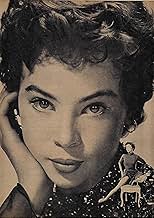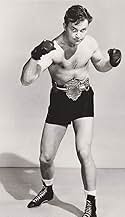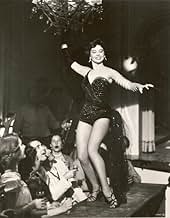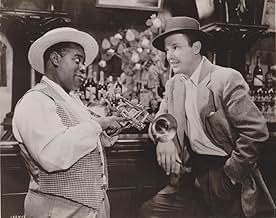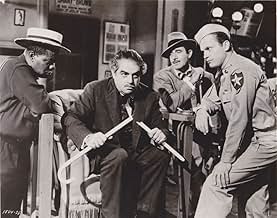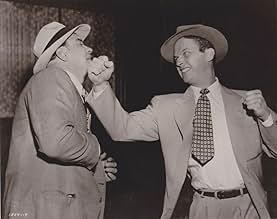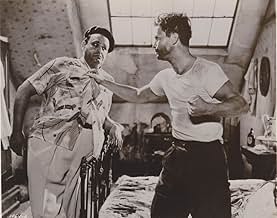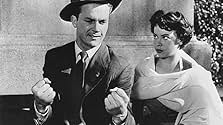An about-to-retire New Orleans newspaper columnist tells the story of a most unforgettable character: boxer Socks Barbarossa.An about-to-retire New Orleans newspaper columnist tells the story of a most unforgettable character: boxer Socks Barbarossa.An about-to-retire New Orleans newspaper columnist tells the story of a most unforgettable character: boxer Socks Barbarossa.
- Fighter
- (uncredited)
- Waiter
- (uncredited)
Featured reviews
THE FILM APPEARS to have been assembled using bits and pieces of other genres from previous periods in Hollywood history. Director Raoul Walsh, himself being if not exactly a sort of living anachronism, was a sort of living, breathing history of the film industry. His own career had begun in the Silents, but before the cameras as actor. (He famously portrayed John Wilkes Booth in D.W. Griffith's BIRTH OF A NATION.)*
SO, CALLING ON his many experience as actor and director to bring us a story that was both similar and yet unlike anything else. The story exists both in a period of time (Post World War II New Orleans, Louisiana) and yet is timeless. Its reference and involvement with the Korean War could just as easily have been World War II. This leads us to believe that the story had been around, sitting on the shelves, gathering dust before it finally got made.
IN MANY RESPECTS the production looks like a comic strip or comic book display of "sequential art". The manner in which the characters, both main and supporting, are made to fit neatly into conformity of their particular pigeon holes. The Judge, Pig and Shadow Johnson (Louis Armstrong) are all prime examples.
AND IN SPEAKING of the cast, we found it to be both well constructed , if just a trifle far ranging. Leslie Caron finds her way into a most unusual portrayal of a potentially gifted ballerina's being forced to perform in dance halls. Louis Armstrong does a fine job of being general purpose good guy and servant. His duties range from boxing corner man, musician and valet to the Judge.
IT IS PERHAPS the one role, odd as it may seem, to showcase the talents of Ralph Meeker as main character, Socks Barbarossa. Being a very complex man with great wisdom and many other eclectic talents. Making the hero a denizen of the gutter (Glory Alley) just adds to the drama.
WE MUST MENTION the role of narrator, retiring newspaper man, Gabr Jordan (John McIntyre), who adds a touch of authenticity to this convoluted, meandering, hybrid of a story.
WE ALSO MUST posit the question: Did John McIntyre ever look young or portray a younger type? NOTE: * As director Raoul Walsh had compiled a tremendous number of very memorable pictures, largely at Warner Brothers. They include: WHITE HEAT, GENTLEMAN JIM, THED STRTAWBERRY BLONDE, HIGH SIERRA, THE ROARING 20's,.......................
Ralph Meeker. Best remembered as Mike Hammer in Kiss Me Deadly, he caught the studio's eye when he replaced Marlon Brando on Broadway as Stanley Kowalski in A Streetcar Named Desire. On the off-chance that the N'Awlins setting might work its voodoo once more, the brawny Meeker was cast as a prizefighter called Socks Barbarossa.
Leslie Caron. Fresh from An American in Paris, she was at best a dancer with a Gallic accent and gamine charm. Here, she supports her blind father (Kurt Kaszner) by kicking (en point, no less) in hoochie-koochie numbers in a dive called Chez Bozo; it's a cross between Harriet Hoctor and Mary Tyler Moore as Laura Petrie, dancing in Capris.
Louis Armstrong. Instead of turning him into a jazz-joint headliner, he's relegated to the part of a philosophizing guide for the sightless old grump; thankfully, he sings a few songs and blows his horn now and again.
All in all, Glory Alley is a Runyonesque slice of life set among the poor people of the Big Easy. Meeker, in love with Caron but hated by her father, sustains a none-too-plausible run of ups and downs (there's even an excursion to Korea). It's a pot-luck special, made (it seems) to clear out the studio's larders.
Ralph Meeker, the brilliant star of "Kiss Me Deadly" who did way too few movies, plays a boxer named Socks Barbarosa. Maybe Bill Clinton named his cat after this character.
Meeker is also very good in "Show In The Sky." He was generally underused ion movies, though.
"Glory Alley" is a kind of faux-Damon Runyon. Runyon gone South to New Orleans. We have Socks. We have a blind man called the Judge. His helper, played by Louis Armstrong, is named Shadow.
The Judge has an Italian accent; yet his daughter has a French accent. And no wonder: She is Leslie Caron. Caron and Meeker could have been a fantastic combination. She's appealing. It's hard, though, to believe that she is doing music hall numbers at a dive called Chez Bozo and her father doesn't know it. He seems to know everything else that's going on.
The movie is narrated by newspaper reporter John McIntire. It's a voice-over narration, looking back on the vents we're seeing. But this is no noir. McIntire tells us it's the most fascinating story he ever covered -- and he's never told the truth till now -- is that of Socks Barbarosa.
Well, it could have been a fascinating story. It's peopled with fine actors and a superb leading man. But it doesn't hold together. This is not to mention its preaching: Much of the dialogue, especially toward the end, sounds as if it came from a sampler on a wall. Nor what sounds like the MGM Chorale that accompanies some of Armstrong's trumpet playing and is sort of an uplifting Greek chorus.
Then we have Leslie Caron as his love interest. It looks like this part was hurriedly re-written for her after her triumph in AN American IN Paris. She performs ridiculous ballet routines in a seedy bar (you know the patrons would have booed her off immediately). You see she wanted to be a ballerina, but she gave it all up to support her blind father. He's played by Kurt Kaszner - an actor still in his thirties but donned with silly silver hair to make him look ancient and wise.
Then there's Louis Armstrong, sadly named "Shadow", and seemingly the only African-American in New Orleans. He's supposed to be Meeker's trainer, but he spends the whole movie playing his trumpet and leading absurd sing-a-longs at the local bar. He does have a couple of good acting scenes though. The excellent Gilbert Roland floats around the film's edges with nothing to do, while John McIntire adds pseudo profound narration to the story - told in flashback like a film noir.
Probably the worst sequence in the film, and that's saying something, is the ludicrous Korean War scene, with some stock footage, four soldiers, some sort of pine forest and a rear projected bridge deemed sufficient to portray a major world conflict.
So we have a boxing picture, a musical, a film noir, a war film, and a pseudo-Freudian psychological study all rolled into one! What more could you ask for?
It's hard to believe a fine hard-boiled director like Raoul Walsh oversaw this mess - he probably wanted to run straight back to Warner Bros afterwards.
Did you know
- TriviaNone of the songs performed in the film are listed in the on-screen credits. In addition to the songs Louis Armstrong performed in the film, he recorded another song, "It's a Most Unusual Day," by Jimmy McHugh and Harold Adamson, but it was cut. That outtake, several songs from this film, plus songs from other Louis Armstrong M-G-M films, were included on a CD anthology entitled "Now You Has Jazz: Louis Armstrong at M-G-M," released in 1997 by Rhino Records.
- GoofsAt the 40 minute mark, Angie begins reading a letter from Socks. As she holds up the one-page letter, it is clear that there is no writing on the back of the letter. However, she turns the letter over and seems to be reading the back of the letter. After dancing in the living room, she picks up the letter again, and the entire front page is visible, and one can see that the entire letter is written on the front page only.
- Quotes
Gabe Jordan: Politicians aren't New Orleans. For the real story you gotta go to the - real people. The people of desire on Piety Street. The people of piety on Desire Street. And the people of good intentions on Bourbon Street. My street. My favorite beat. It has more grifters, grafters, guzzlers, and guts than any other street in the world. Buccaneers Alley, Thieves Alley, and this stretch, the block I call Glory Alley. Glory Alley - a world of square guys with round edges. Where love with larceny, courage and crime, nobility and amorality, come out of the same barrel. Beer barrel or whiskey barrel, preferably bourbon. Life is fundamental to mugs, pugs, and lugs. You settle it with fists or rationalize it with dreams out of a bottle. Yet, in the bottom of life's gutter, you can find, if you look up hard enough, more beauty, dignity and sensitivity, than anywhere else in the world. Has beens, might have beens, never was it, and - champions.
- ConnectionsEdited from Modern New Orleans (1940)
- SoundtracksGlory Alley
(uncredited)
Music by Jay Livingston
Lyrics by Mack David
Sung by chorus over opening credits and at the end
Details
- Release date
- Country of origin
- Language
- Also known as
- El callejon de la gloria
- Filming locations
- Production company
- See more company credits at IMDbPro
Box office
- Budget
- $971,000 (estimated)
- Runtime1 hour 19 minutes
- Color
- Aspect ratio
- 1.37 : 1
Contribute to this page


